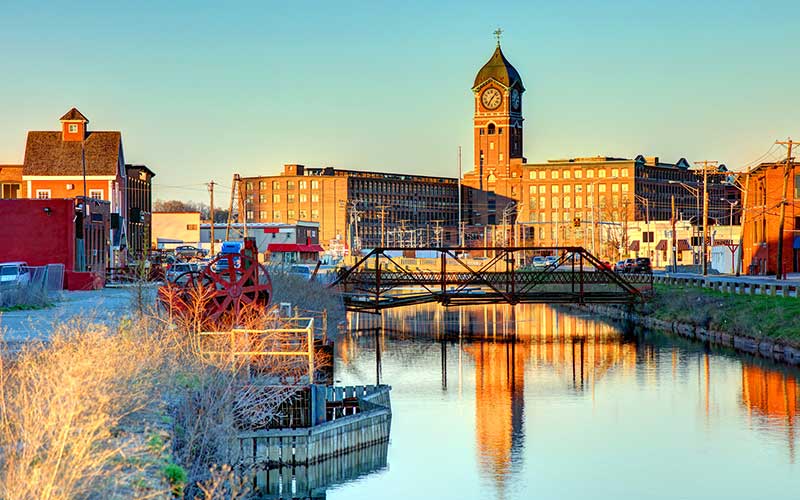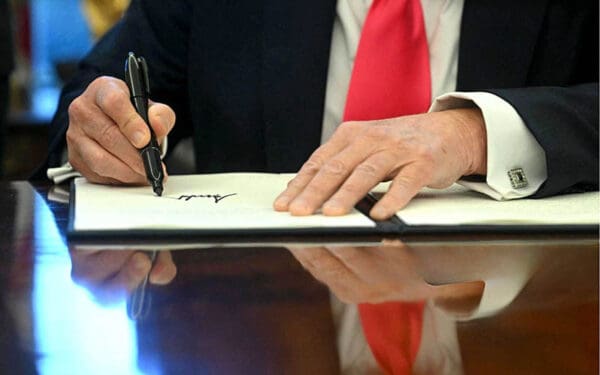
Residents in Lawrence, Massachusetts, are at the heart of this community-led effort to develop strategies to overcome health and climate inequities. Photo: Dennis Tangney via IStock
Extended heat waves, stronger nor’easters, more intense and frequent rainstorms – these are some of the climate impacts expected to affect New England. But they will hit some communities harder than others. Those living in urban areas with little tree cover, for example, suffer more when heat waves strike. The acres of buildings and pavement create a deadly heat island effect, in which temperatures soar even higher and air quality worsens.
The same areas that will be hit hardest are usually home to more families of color and low-income families than other parts of New England. With support from the Robert Wood Johnson Foundation, CLF and Groundwork Lawrence have launched a 30-month project to address such climate inequities in Lawrence, Massachusetts. The goal: to create “resilient corridors” that will allow residents to safely walk or bike to parks, community centers, schools, and other critical destinations via shaded and flood-resilient streets and paths. These corridors do double duty – building climate resilience for tomorrow while addressing health disparities today. The project is part of an initiative funding six U.S. cities to bring innovative approaches from abroad that mitigate the unequal health risks posed by climate change.
It won’t be CLF and Groundwork Lawrence determining what to prioritize for these corridors, however. It will be Lawrence residents themselves. A four-member resident task force is both conducting research – they recently placed air quality monitors throughout the city – and engaging neighbors to educate them and hear their ideas for addressing climate issues.
I sat down with task force members Destiny Gonzalez and Eve Rodriguez to hear more about this critical work and what drew them to be a part of it. (Check out our interview with task force members Martha Leavitt and Jorge Hernandez, too.)
This interview has been edited for clarity.
What drew you to this project?
Destiny: In high school, I was involved in a lot of social justice and climate change clubs. And I’ve always been super passionate about not only assuring that we live on a safe planet but also giving back to my community of Lawrence. So, it was just perfect for everything that I wanted to do and everything that I want to do later.
Eve: I’ve worked with the community for 20-plus years now. As a domestic violence survivor and rape survivor, I have always wanted to educate, be a voice, and give back to my community. Recently – I have two grandchildren who are 13 and 11, and they are very much into climate change and what’s damaging to our planet. So they’ve created or provided me with so much insight and awareness that it’s just increased my interest in making better changes in our community and our climate for our community.
What are you most excited about as this project kicks off?
Eve: I’m super excited to learn the exact details of this [air quality] data that we’re gathering. I’m a prevention specialist for the community, so I advocate against smoking in public places. On one of the occasions that Destiny and I were mounting [the monitors], we both stood there and realized, “We feel the air is disgusting right here, and we just feel its tension and its pollution.” You never really think about it that way until you’re into a project of this nature – and then into the impacts that the climate is causing or our choices are causing our climate.
Destiny: I’m excited to convince people about why they should be as passionate about climate change and Lawrence as we are. The fact that I can be one of the voices at the forefront of that change makes me so excited and privileged to even have that opportunity as a college student.
When you think about Lawrence and climate change, what do we need to be paying attention to and addressing?
Destiny: I’m most worried about the lack of education. I feel like many people are unaware of what’s happening or how their actions are damaging to not only our city but, in the long term, our country and the world. I even have family members who don’t understand why recycling should happen or that even little things can go a long way. I’m also worried about the older population here in Lawrence. We see great youth advocating for climate justice here, but I’m worried about the lack of education for the older population.
Eve: And I’ll piggyback on that. There’s definitely a generational gap when it comes to awareness, knowledge, and just understanding the importance and the relevance of being a part of the change. Whatever steps we take will only increase our chances to better our climate.
What do you think your neighbors don’t understand about climate change impacts? Or maybe why do you think they don’t understand?
Eve: I didn’t grow up with people talking about climate change and its impact on our world. I didn’t grow up with how important recycling was, what relevance recycling had, why we should be doing it – let alone my mother’s generation or my grandmother’s generation. They had no education on climate impacts and better choices to make to take care of our communities, let alone our planet.
So I think that it’s more of, again, a generational thing, but also a cultural thing. You don’t see recycling as much in Puerto Rico or Santo Domingo. You don’t see it in very poor nations like in South America. So now, when you have a beautiful immigrant city like ours that is full of Latino immigrants, how do you not only break that cycle and educate but also shift mindsets? That’s the main thing we need now – to have them readapt and change their norms to cultivate new norms for the betterment of our planet.
Destiny: I could not have said that better. That was amazing.
You have these people who work their butts off to get to this country. They moved their entire life here for a better opportunity. And they don’t understand why using the plastic grocery bags is bad. They’re just trying to get their groceries; they’re just trying to work their nine to five.
And, I think that it’s difficult when there’s so much pressure to succeed, to make ends meet. It’s like, “Why should I have to choose between eating food and going to a climate change event? Why should I care about that when I’m struggling to feed my family?”
But if only they understood, “Your kids are going to grow up on a world that is going to be unlivable.” If you use that narrative, that’s going to start to switch things because they’re only here to give their kids a better life. If they understand that giving your kids a better life is also about bettering the climate in your city, then that’s going to start changing mindsets. Then people are going to start taking initiative.
Eve: Exactly, exactly, exactly. There’s no better way to put it. Creating that narrative, telling our story, but making our story their own. We need to make sure that they know that this is their story, not only ours. It is a community story. It is your children’s story. It is your grandchildren’s story, their children’s story.
So what will be the role of the community in this project?
Destiny: I think it’s the biggest role. They ask and we provide. If they ask, “We need this in order to feel confident about moving forward with the climate justice here. We need more trees in this part [of the city]; we need more trees in that part of Lawrence.” That’s the kind of input that we need to make life better. Or even knowing that right here, I can’t breathe in this part of Lawrence.
Then, how are we going to fix that? How are we going to make this super-congested part of Lawrence more livable? “Why is my apartment overheating, and how can you guys help with that?” That type of input is going to be so necessary moving forward. So their voices are the biggest voices, and that’s going to allow us to reach more people and achieve our goal of getting real empirical change in Lawrence.
Eve: Yes, I couldn’t have put it better. It’s all about just having that data to prove that this is what’s really happening. I want to say that our residents are very fact-based. They need to see it to believe it. When you provide them with the data and that empirical evidence, I think it not only makes them think – but we’re overthinkers naturally, culturally overthinkers – I think it’ll make them start overthinking about, “Wow, this is how I’ve lived. These are the choices I’ve made. I need to change that. Okay. Now how do I do it?”
Now, how do we move forward, making their choices easier, making their lives easier? Or how can we provide spaces where apartments aren’t overheating? How can we provide spaces where people aren’t paying $400 a month in electricity because they need to cool off their apartment? Or, how can we make safer breathable spaces by providing trees?
Let’s make that choice better for them to make.
Okay, changing gears now. What are some of your favorite spots in Lawrence?
Eve: I’m born and raised here all my life. I love all of my city, but, in particular, its historical spots. It’s really a beautiful city. And I think a lot of people forget that it has so much history behind it, and so much was built by our very own immigrants in the city. That makes me a proud Lawrencian.
Destiny: Going off of that – I love the history. I am full Lawrence, born and raised. Lawrence has made me the person I am, given me opportunities.
So, my favorite places – there are so many! Foodwise, I love Terra Luna, and I love El Taller because it’s so artsy.
Eve: El Taller! Yes!
Destiny: The talent, the food, the people. Every time I go to El Taller, I always feel like this is what it’s like to be a Lawrencian.



